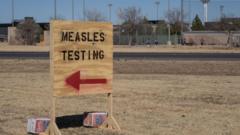An alarming report released by the US government on children’s chronic health issues has been challenged by academics listed as authors of fabricated studies. The findings, which link various environmental and lifestyle factors to children's health crises, are under scrutiny for inaccuracies.
Academics Challenge Fabricated Sources in US Health Report

Academics Challenge Fabricated Sources in US Health Report
A recent government report on children's health has drawn criticism for citing non-existent studies, sparking concern among academics.
A government report released by the US Health Secretary Robert F Kennedy Jr. has come under fire for referencing studies that scholars say do not exist. The report, first made public on May 22, aimed to identify causes of a "chronic disease crisis" affecting American children, but was amended just days later when digital media outlet NOTUS revealed that it included seven non-existent sources.
White House press secretary Karoline Leavitt acknowledged "formatting issues" in the cited works, stating the report would be revised but insisted that this did not undermine the core findings. The released document was developed under the Make America Healthy Again Commission, established following executive orders from President Donald Trump directing investigations into childhood health concerns.
The report highlights contributors to chronic illnesses in children, citing factors such as poor diet, environmental toxins, stress, and inadequate physical activity. Yet, authors of the studies cited, such as Guohua Li and Noah Kreski from Columbia University, publicly denounced their purported associations with the document. Li labeled the citation of his work as "totally fabricated," while Kreski echoed that the referenced study "doesn't appear to be a study that exists at all."
Katherine Keyes, an epidemiology professor who also found her name unjustly included, expressed concern over the propagation of misleading citations within scientific publication, emphasizing the importance of robust citation practices in credible research. Moreover, additional claims were termed false by institutions regarding citations tied to psychotropic medication studies.
The Democratic National Committee criticized RFK Jr.'s Department of Health and Human Services for allegedly justifying their policy priorities with non-existent references and the prevalence of erroneous citations within the report. Since his appointment in February, RFK Jr. has made significant changes within the health department, including job cuts and the proposal of placebo trials for new vaccines, raising eyebrows about his controversial approach to health policy.























